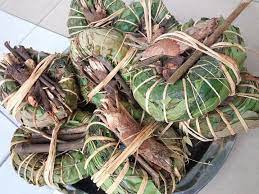One of the things the Igbo people are known for is their fast recovery from childbirth and that can be attributed to the Igbo herbs for weight loss the women consume, to help them shed the extra weight, and snatch their tummy back, well almost, to its original state. Therefore, if you are seeking for herbs that will help you reduce weight, manage weight, or combat obesity, choose any of the Igbo herbs for weight loss and you’ll be glad you did.
[ninja_tables id=”66218″]
Weight loss has been an issue for many people, despite their engagement in exercises and restrictive diet, they have continued to struggle with weight loss. It always seems as if their body decides when to shed weight and when not to, regardless of the effort they put in. however, one of the easy ways to make the body agree with your decision to lose weight is to use herbs for weight loss. These herbs help to suppress appetite and increase the rate of metabolism.
In this article, you will get information about the best and most effective Igbo herbs for weight loss, that will help you on that journey you’ve been on. We will also make sure you’re informed about the constituent of each herb and how you can use them for weight loss.
The Issue Associated with Overweight and Obesity
Overweight and obesity continue to be a growing issue among adults and children around the world, according to the World Health Organization. It is at the other end of the double-sided malnutrition – which some people only attribute to just underfeeding or having inadequate amount of nutrient supplied to your body as is needed on a daily basis. However, malnutrition also encompasses the excessive supply of nutrients to the body, so much so, that it leads the body to an unhealthy state, and consequently affects the quality of life of the affected individual.
Here in Nigeria, many people are daily seeking to shed weight, and have done and will do anything to make their objective realized. However, they have had little success and have become frustrated that they neglect the right way to lose weight and constantly seek fast-track means.
With overweight and obesity comes many health issues, some of which are life threatening, but manageable. Some of the health problems that come with obesity and overweight include:
- Diabetes
- High blood pressure
- Gout
- Sleep apnea
- Heart diseases
- Osteoarthritis
Although this list is not exhaustive, it contains some of the common health implications of being obese. However, not every obese patient has these conditions.
How to Lose Weight Healthily
To enjoy your life and run a lesser risk of being a patient of the above health conditions, you must lose weight, and do so in a healthy manner. While there are many avenues for weight loss, there is no one-size-fit-all approach. However, the foundations of weight loss re all the same.
The principles that guide weight loss include one or a combination of the following:
Restrictive diet
One of the most effective ways to lose weight is to reduce the number of calories you consume. This helps your body get into a state of caloric deficit and it begins to use up the energy source it has stored away for future use.
One of the ways to achieve this is to follow a diet plan, which may be difficult for you. This is where Igbo herbs for weight loss comes in. They will help you hold back on eating unnecessarily by reducing your appetite.
Exercising
While dieting is great, you get better results when you combine it with exercising. It not only helps you lose weight, it also helps to add muscle definition to your body, in the right places, improving your overall physical appearance and helps you avoid looking like you are convalescing from a sickness.
Medication
Some people need medication to help them stay true to their diet and weight loss objective. Herbs can also be classified as medications. However, in this case, they work as well as tablets, to suppress appetite, making dieting more effective.
Cosmetic Surgery
Sometimes, an individual might need to go under the knife to remove excess skin after weight loss. Other times, they need to undergo surgery to help them kickstart that weight loss journey. This principle helps them remove some fat, usually from the stomach, arms, and thighs, making their journey shorter, but no less easy.
These principles can be individually honored or collectively used for a better weight loss result. Regardless of what combination you choose to follow, using medication may be important for you. If that is your case, you should consider using Igbo herbs for weight loss.
Igbo Herbs for Weight Loss
The Igbo herbs for weight loss comprise of vegetables that are not usually macerated to extract the juice like the Yoruba people do. Instead, they are usually cooked to be eaten, or the water drunk. It is common knowledge in Nigeria that the Igbo people are knowledgeable in nutritious herbs and vegetables. Therefore, it may be of help to you to consider this list of Igbo herbs for weight loss.
Ugu
Ugu, as it is popularly called everywhere in the country, but goes by the scientific name, Telferia occidentalis, is a leafy vegetable that is commonly consumed for its nutritious nature. It is commonly used to treat anemia as it is rich in iron and other minerals. It also possesses antioxidant properties, making it suitable for dealing with oxidative stress.
These properties make it a good Igbo herb for weight loss as its fiber content is also high. It is commonly cooked with spices and used to eat swallows.
Aju Mbaise

Aju Mbaise is a core Igbo herb for weight loss. It is so effective that it is used to help women who have just had their children regain their shape. It is made with a combination of leaves, roots, and seeds. The main ingredient, Aju, is usually dry and can be cooked in water or as vegetable to be eaten.
Aju Mbaise helps to detoxify the body, regain fertility, and treat some infections.
To get the best out of this Igbo herb for weight loss, combine Aju with Uda seeds, and Uziza seeds. Boil the combination for about 30 minutes and scoop the water to drink. You can also choose to cook the combination as a soup, especially for nursing mothers.
Kerenkere
Kerekere is called ewedu in Yoruba, and it is the common jute leaf. It is a nutritious vegetable that is commonly cooked and beaten or blended to form a watery paste.
Kerenkere is rich in fiber, a nutrient that helps to make you feel full for a long time and improve the ease with which you pass solid waste. The abundance of fiber helps to curb your appetite and makes you eat less. It can be consumed alone, but it is commonly eaten with other soups and swallow.
Uziza
Hot pepper helps to burn fat; therefore, Uziza leaves and seeds – known to be characteristically hot and spicy – are also efficient as fat burners, consequently helping you lose weight. As one of the Igbo herbs for weight loss, uziza is used to make soups, especially for nursing mothers.
Its leaves are tough and are usually grounded to bits and added to soups as a spice, although sparingly, due to its hotness.
Water leaf
Water leaf is a popular vegetable that is rich in fiber. It is a very common vegetable among the Igbos, making it one of the Igbo herbs for weight loss. It can be found almost anywhere, especially during the rainy season, and can be bought in the dry season.
It is low in calories, and high in fiber, a combination that favors weight loss and help you get closer to your aim.
Conclusion
Igbo herbs for weight loss abound around us. However, we do not see them because we expect them to be bitter and available as tea alone. If that is your preference, Aju Mbaise is there for you. However, there are Igbo herbs for weight loss that you can consume as vegetables and part of your soup.
If you are struggling with weight loss, use any combination of these Igbo herbs for weight loss, and due to their high fiber content, low calories, and other nutrient richness, they will help you reach your goal faster.


